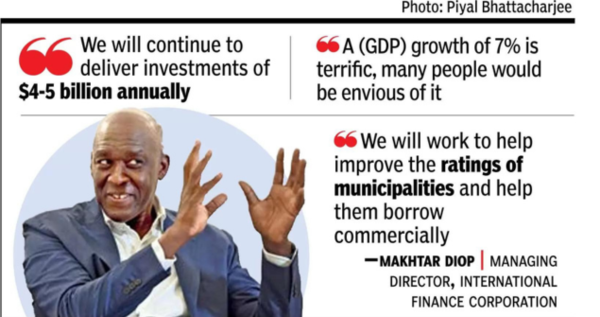Makhtar Diop, managing director of International Finance Corporation (IFC), the World Bank’s private sector lending arm, is looking to broaden the focus on India to include the issue of blue bonds, modelled on the lines of green bonds but focused on water, and also help municipalities raise funds. Excerpts:
Since you last came to India, how do you see the progress in terms of the goal you had set for IFC?
India is our largest portfolio.Our goal was to double the portfolio. We have tripled it. I am happy that we have been able to respond to needs and build a strong relationship not just with the federal govt but also with companies and investors. In the last three years, despite the uncertainty, we have doubled our annual commitment to $64 billion this year. In India, we are doing a lot of equity and not just debt. Our largest portfolio in equity is here in India. While our India portfolio exposure stood at $8.7 billion at the end of Aug, which is 11% of total IFC, the India equity portfolio was around $3 billion. This is 36% of our portfolio in India, compared to 19% globally. We are mobilising resources in India because of the strong macroeconomic performance. We would like to syndicate more investment.
So, when you meet FM Nirmala Sitharaman, what are you going to tell her on how much investment you are going to make annually?
We will continue to deliver investments of $4-5 billion annually. I am going to Uttar Pradesh and I want to work with states. We will work to help improve the ratings of municipalities and help them borrow commercially. Second is continued work on energy transition, where we have seen a lot of success. The attempts for diversification of production bases offers a good opportunity to India to get into this space. In the financial sector, we are helping banks issue green bonds and now we are ready with blue bonds, which is an important part of our offering for water, marine plastics, water management. Water is part of the climate change agenda, which has not been discussed enough and it is also linked to municipal services. Another thing which we want to start looking at is solutions for cooling, which is becoming more important for developing countries. If we get it right, it offers enormous opportunities and help in energy transition. Agriculture is another focus area.

How do you see the macroeconomic situation in India and what are the challenges?
A growth of 7% is terrific, people would be envious of it. There is a general issue of job creation, which is there in every country. It is the challenge of the century. It’s not just jobs, it’s quality jobs. The same way as Ajay (Banga, the World Bank chief) has created the private sector investment lab, he is in the process of putting in place a job council, where practitioners will bring best practices. One of the KPIs at the World Bank group will be job creation in the public and private sectors.
The reform of the World Bank group was flagged and agreed during India’s G20 presidency. It included a greater role of private investment and commitments and IFC was expected to play a part. What is the progress and have real reforms taken place?
When Ajay Banga took over, I worked with him to set up a private sector lab with top investors. A few things came out, they need policy certainty from the sovereign govts and the World Bank can help. The second one was guarantees in emerging economies, both political and commercial. Third was global uncertainty and keeping volatility under check. The fourth element was the size of the planet as some of the asset managers were $1 billion projects. In India, you have a Viksit Bharat vision with PLI and a strategy to get investment moving out from some other countries. For guarantees, MIGA has brought everything under one umbrella through standardised solutions. We are still working on local currency. The last one is pipeline and syndication. We have a securitisation platform, and the assets are being pooled. We are working on IFC 2030 Vision, and we will incorporate a lot of elements. For instance, we are planning to round up a lot of equity. When we talk about investing in emerging assets, all these asset managers want to do debt but often find equity to be risky. So, we need to do more equities. We will also use our balance sheet to de-risk some of the investments. Currently, we are discussing the possibility of having a first loss fund, which allows you to absorb some of the volatility in the equity market.
Have you been able to shrink the timeline for processing proposals?
We needed to simplify processes, while maintaining its integrity. As soon as I came three years ago, decision-making was decentralizsed. We gave more responsibility to the regions instead of so many things converging in Washington. We increased the threshold for the vice president and regional directors to decide. We cut the number of committees involved. We simplified the decision-making process and asked people to come with three major points to be decided. It was a change of culture because people were bringing all decisions to the committee. We also need to take risks. The non-performing loan ratio has come down. We are also using a lot of technology to save time and use that time for interface with clients. The time taken has come down by nearly half. It’s work in progress, although the team has embraced it far more than what we thought.





